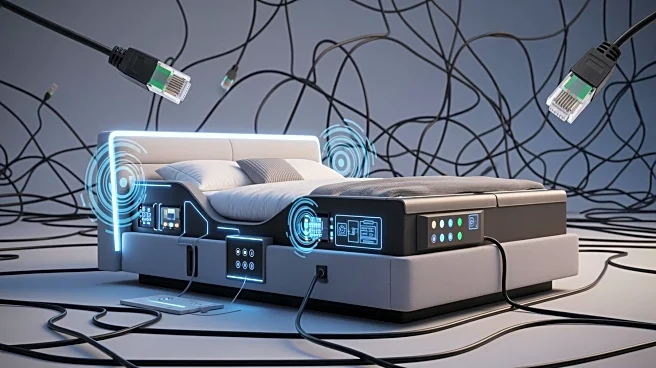What's Happening?
A recent massive Internet outage has highlighted the vulnerabilities of smart home technology, particularly affecting users of the Eight Sleep Pod smart bed. During the outage, many owners found themselves
unable to control their beds, leading to discomfort and frustration. Some users reported their beds being stuck in an inclined position, while others were unable to adjust environmental controls, resulting in uncomfortable sleeping conditions. Eight Sleep responded promptly to the issue, working to restore functionality and announcing plans to 'outage-proof' their products to prevent future disruptions.
Why It's Important?
The incident underscores the dependency of smart home devices on stable internet connectivity, raising concerns about the reliability of such technology in critical situations. As smart home devices become more integrated into daily life, ensuring their functionality during outages is crucial for user satisfaction and safety. This event may prompt manufacturers to enhance the resilience of their products, potentially leading to innovations in offline functionality and increased investment in infrastructure to support smart technology. Consumers and industry stakeholders alike may push for more robust solutions to mitigate the impact of similar outages in the future.
What's Next?
Eight Sleep's commitment to 'outage-proofing' its products suggests a shift towards more resilient smart home technology. This may involve developing systems that can operate independently of internet connectivity or implementing backup solutions to maintain functionality during outages. Other smart home device manufacturers might follow suit, prioritizing reliability and user experience. Additionally, discussions around infrastructure improvements to support the growing demand for smart technology could gain momentum, involving collaboration between tech companies and internet service providers.
Beyond the Headlines
The outage raises broader questions about the ethical and practical implications of increasing reliance on smart technology. As these devices become more prevalent, issues of privacy, data security, and user autonomy come to the forefront. Ensuring that users retain control over their devices, even during connectivity disruptions, is essential for maintaining trust in smart technology. This incident may catalyze discussions on the balance between convenience and control, influencing future design and policy decisions in the smart home industry.










